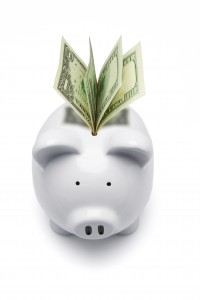
Paying off loans can put money back in the bank – via Shutterstock
Paying off my student loans was the best thing that I did for my budget – and I owe it all to Suze Orman. Did you know that Americans have more student loan debt than credit card debt? In fact, according to Orman, we have over one trillion dollars out there in student loan debt. That’s insane! So, when Orman told me (well, not ME me. The room.) that if my $6,000 student loan debts were my only personal loans, then I should pay them off in full – pay them off I did.
How paying off student loans helped my budget
It was 2011, and I was attending a conference in which Suze Orman was the keynote speaker. Most of the topics she was covering didn’t apply to me – I didn’t play the stock market, I was nowhere near retirement – I wasn’t even concerned with loan consolidation. But my ears perked up when a woman about my age (29) asked this question:
“I have $5,000 left on my federal student loan. I don’t have any other loans besides my mortgage, my monthly expenses are $1200 and I have about $8,000 in savings. Should I pay off the loan, or keep making my $200 monthly payments until it’s gone?”
Suze, without hesitation, said, “Pay it off. Pay it off today.” It startled the young woman, and it startled me. I mean, we’ve all heard the student loan myths. Was this really the right choice?
“But. But then I’ll only have $3,000. What about an emergency? What about my savings?”
Orman’s reply was simple. She said that it would take over two more years for the woman to pay her loan balance, including interest. If she paid off the balance today, she could continue to make the $200 monthly payments, but to herself, directly into her savings account and interest free.
As for an emergency, Orman recommends always having 3-6 months of expenses in savings. She said the woman was young, in good health, with good insurance. $3000 was a comfortable amount to start with and in as little as six months, she’ll already have built her savings back up by $1200.
Orman went on to say that student loan debt is THE most dangerous debt, because it is the only debt that cannot be discharged in bankruptcy. That means, even if you lose your job, have a major health emergency or otherwise have to file bankruptcy, you STILL have to pay that loan, NO MATTER WHAT. And even if you defer payment on that loan, the interest continues to accumulate over time – which can double, even triple the initial cost of the loan.
My brain went to work: After paying $200 a month for eight years, I still had $6,000 to go. And I had $10,000 in the bank for a rainy day or the apocalypse. Could I do it? Could I really get out from under Sallie Mae’s thumb?
I decided to go for it, went back to work, fired up the computer and paid off my student loan RIGHT THEN AND THERE. And I never looked back.
It felt SO GOOD.
In the months to come, I was able to build my savings back up by being diligent with my budget, and was lucky enough to not have any financial emergencies while doing so. And while I still had a $200 a month “expense”, I knew 100% of it was going towards my future. And if expenses got out of hand a particular month, I could rest easy that I had an extra $200 to fall back on.
Now. I realize I had different circumstances than some, and this might not come as easy for you. But if you find yourself wondering, “Should I pay off my student loan while I have an extra bit of cash?”, know that Suze Orman and I say yes. Yes you should.
What is the best financial advice you’ve received?








In order to pay off my student loans, I had to make a change in my budget. I had to cut out all the things I loved spending money on and start saving it. I began by cutting my cable TV subscription and started getting rid of all the unnecessary things I had been buying. After a few months of saving, I had enough money to pay off my student loans. Now that I have paid off my loans, I am able to spend my money on things like a vacation or a new car. Now you can also buy online assignment if you have no idea how to write it or you have no time for this.